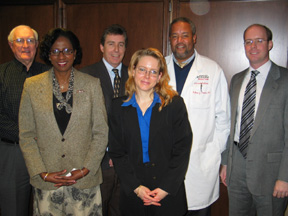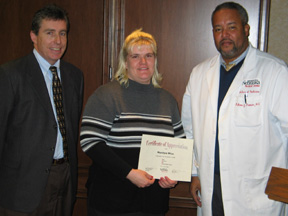 |
Project LEAD team members are, from left, Jack Lewis, M.D., Rosaline Olade, Ph.D., County Attorney Stuart J. Dornan, Theresia Urich, Rubens Pamies, M.D., and assistant county attorney Burke Harr. |
Since last fall, a Nebraska pilot version of Project LEAD has been working with students from Liberty Elementary, Westgate Elementary School and Underwood Elementary School in the Westside Community School District and Omaha Public Schools District.
Project LEAD in Omaha grew from relationship shared by Jack Lewis, M.D., UNMC associate clinical professor of medicine and Stuart Dornan, Douglas County Attorney. They both are members of Omaha Community Partnership (OCP), an association of law enforcement officials, judges, attorney generals and other community members. Dornan introduced the California program as a possible project for the OCP. Dr. Lewis volunteered to develop a health component.
Dr. Lewis started by focusing on smoke-related issues. He contacted Rubens Pamies, M.D., UNMC vice chancellor for academic affairs and dean for graduate studies, to help put a health team together for the project. In addition to medical and nursing student volunteers, the UNMC team also included Valda Boyd Ford, director of Community and Multicultural Affairs, Rosaline Olade, Ph.D., associate professor in the College of Nursing, Peggy Tidikis Menck, Ph.D., assistant professor in the College of Nursing.
“We visited three different grade schools, using a dozen student nurses to talk about tobacco prevention issues,” Dr. Lewis said. “We had 40 to 50 kids per session and 80 to 90 percent of those kids indicated they had parents who smoked. Then, Dr. Pamies joined Project LEAD to teach the kids about eating and lifestyle choices.”
“Project LEAD is a great example of how big institutions can collaborate at such a basic
level to meet the needs for education and the prevention of future problems among school children in Nebraska,” Dr. Pamies said.
“The nursing and medical students who were involved in the presentations were really impressed at the level of interaction from the middle school children. Many of the children were excited about the health topics and very excited about taking home the little posters provided for them. Many took extra posters and said they would share them with friends and family – even put them up in their bedroom as a constant reminder of what they learned from Project LEAD.”
Project LEAD targets fifth-graders for a 12-week curriculum. Once a week, each class receives a one-hour Project Lead team presentation by the law enforcement team or the medical team. UNMC health science students and faculty make presentations on such health issues as cancer prevention, smoking prevention, drinking and driving, drug abuse and how to maintain healthy lifestyles.
“Crime is one of society’s most difficult problems,” said Dornan, a parent of eight children and former Westside Community School board member. “It threatens the safety of and intimidates law-abiding citizens, while consuming enormous resources from our law enforcement and judicial systems.
 |
College of Nursing student Marilyn Wise was one of 24 volunteers who received certificates of appreciation from Stuart J. Dornan, left, and Rubens Pamies, M.D. |
“Project LEAD is designed to help students recognize and analyze potential consequences of the difficult decisions they face during adolescence and beyond. By focusing on peer pressure, self respect and responsibility, Project LEAD gives students the tools necessary to avoid many of the pitfalls and traps that often lead to delinquent conduct and criminal activity.”
Assistant County Attorney Theresia Urich has made three Project LEAD presentations and is co-chair of the LEAD committee. In particular, she has discussed domestic violence with students and coordinated several mock trials at the end of the first 12-week session.
“We do a lot of scenarios around relationships and dating,” Urich said. “Young people who haven’t already experienced domestic violence in the home will often experience such issues when they begin to date and develop relationships.
“We begin with mental and psychological pressures because things don’t always start right away with hitting and pushing. We role play different situations and then ask the kids how they view what just happened. They begin to understand how so much of these issues evolve from a need to control another person.”
The end of the pilot semester was crowned by mock trials at each of the schools. The kids play judge, jury, prosecutor, defense attorney, witnesses and defendants. The adults act as bailiffs and keep order. Urich said the kids really get into the mock trial. The trials use the charge of drug possession on school property, a very real occurrence in today’s society, and spice up the role-playing by entering a bag of oregano as evidence and other reality features. The students relished the opportunity to go into deliberations as jury members.
“What we found at the end of our pilot semester was that many of the kids had gone from tentative and reticent around us to relaxed and quite open,” Urich said. “We are trying to give young people a perspective on the justice system as something that is protective of their interests and a valuable part of society. I think Project LEAD is a creative force in pursuing this goal.”
Combined with the health science team members, the alternating Project LEAD presentations are reaching Omaha’s children at a most formative age. For many of the students, they are interacting with law enforcement representatives and getting valuable health information that may help them forestall the need for health service interventions later on. Eventually, Project LEAD plans an outcomes study, perhaps by doing an extensive survey of the kids when they enter tenth grade, in order to assess the effectiveness of the earlier interventions.
For more information about joining the Project LEAD team or to request a presentation, contact the UNMC Office of Academic Affairs at 559-6604.